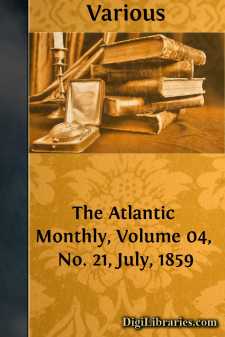Categories
- Antiques & Collectibles 13
- Architecture 36
- Art 48
- Bibles 22
- Biography & Autobiography 813
- Body, Mind & Spirit 142
- Business & Economics 28
- Children's Books 17
- Children's Fiction 14
- Computers 4
- Cooking 94
- Crafts & Hobbies 4
- Drama 346
- Education 46
- Family & Relationships 57
- Fiction 11829
- Games 19
- Gardening 17
- Health & Fitness 34
- History 1377
- House & Home 1
- Humor 147
- Juvenile Fiction 1873
- Juvenile Nonfiction 202
- Language Arts & Disciplines 88
- Law 16
- Literary Collections 686
- Literary Criticism 179
- Mathematics 13
- Medical 41
- Music 40
- Nature 179
- Non-Classifiable 1768
- Performing Arts 7
- Periodicals 1453
- Philosophy 64
- Photography 2
- Poetry 896
- Political Science 203
- Psychology 42
- Reference 154
- Religion 513
- Science 126
- Self-Help 84
- Social Science 81
- Sports & Recreation 34
- Study Aids 3
- Technology & Engineering 59
- Transportation 23
- Travel 463
- True Crime 29
The Atlantic Monthly, Volume 04, No. 21, July, 1859
by: Various
Categories:
Description:
Excerpt
THOMAS PAINE'S
SECOND APPEARANCE IN THE UNITED STATES.
"Nay, so far did he carry his obstinacy, that he absolutely invited a professed Anti-Diluvian from the Gallic Empire, who illuminated the whole country with his principles and his nose."—Salmagundi.
We lukewarm moderns can hardly conceive the degree of violence and bitterness reached by party-feeling in the early years of the United States Constitution. A Mississippi member of Congress listening to a Freesoil speech is mild in demeanor and expression, if we compare his ill-nature with the spiteful fury of his predecessors in legislation sixty years ago. The same temper was visible throughout the land. Nobody stood aloof. Two hostile camps were pitched over against each other, and every man in Israel was to be found in his tent. Our great experiment was a new one; on its success depended the personal welfare of every citizen, and naturally every citizen was anxious to train up that experiment in the way which promised to his reason or to his feelings the best result.
The original Federalists of 1787 were in favor of effacing as much as possible the boundary-lines of the Thirteen Colonies, and of consolidating them into a new, united, and powerful people, under a strong central government. The first Anti-Federalists were made up of several sects: one branch, sincere republicans, were fearful that the independence of the States was in danger, and that consolidation would prepare the way for monarchy; another, small, but influential, still entertained the wish for reunion with England, or, at least, for the adoption of the English form of government,—and, hoping that the dissensions of the old Confederation might lead to some such result, drank the health of the Bishop of Osnaburg in good Madeira, and objected to any system which might place matters upon a permanent republican basis; and a third party, more numerous and noisy than either, who knew by long experience that the secret of home popularity was to inspire jealousy of the power of Congress, were unwilling to risk the loss of personal consequence in this new scheme of centralization, and took good care not to allow the old local prejudices and antipathies to slumber. The two latter classes of patriots are well described by Franklin in his "Comparison of the Ancient Jews with the Modern Anti-Federalists,"—a humorous allegory, which may have suggested to the Senator from Ohio his excellent conceit of the Israelite with Egyptian principles. "Many," wrote Franklin, "still retained an affection for Egypt, the land of their nativity, and whenever they felt any inconvenience or hardship, though the natural and unavoidable effect of their change of situation, exclaimed against their leaders as the authors of their trouble, and were not only for returning into Egypt, but for stoning their deliverers…. Many of the chiefs thought the new Constitution might be injurious to their particular interests,—that the profitable places would be engrossed by the families and friends of Moses and Aaron, and others, equally well born, excluded."
Time has decided this first point in favor of the Unionists....












